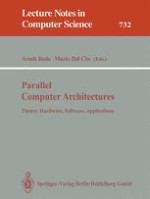1993 | OriginalPaper | Chapter
Randomized Shared Memory—Concept and Efficiency of a Scalable Shared Memory Scheme
Author : Hermann Hellwagner
Published in: Parallel Computer Architectures
Publisher: Springer Berlin Heidelberg
Included in: Professional Book Archive
Activate our intelligent search to find suitable subject content or patents.
Select sections of text to find matching patents with Artificial Intelligence. powered by
Select sections of text to find additional relevant content using AI-assisted search. powered by
Our work explores the practical relevance of Randomized Shared Memory (RSM), a theoretical concept that has been proven to enable an (asymptotically) optimally efficient implementation of scalable and universal shared memory in a distributed-memory parallel system. RSM (address hashing) pseudo-randomly distributes global memory addresses throughout the nodes’ local memories. High memory access latencies are masked through massive parallelism. This paper introduces the basic principles and properties of RSM and analyzes its practical efficiency in terms of constant factors through simulation studies, assuming a state-of-the-art parallel architecture. Bottlenecks in the architecture are pointed out, and improvements are being made and their effects assessed quantitatively. The results show that RSM efficiency is encouragingly high, even in a nonoptimized architecture. We propose architectural features to support RSM and conclude that RSM may indeed be a feasible shared-memory implementation in future massively parallel computers.
